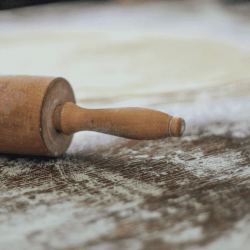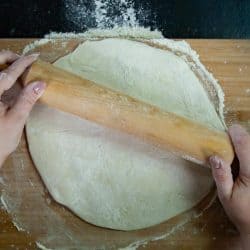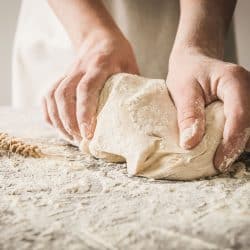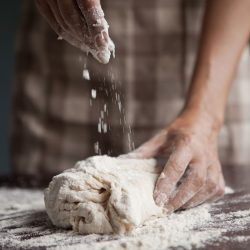Rolling pins come in a variety of shapes, sizes, and materials. They are a basic baking tool, being used for everything from pie crust to rolling pasta dough and pizza crust. Having the right type of rolling pin that is both comfortable and easy to use can be a major advantage for any baker. Selecting the right rolling pin can really help you to work more efficiently in your kitchen.
There are two main differences in rolling pins: those with handles and those without. Working with a rolling pin without handles, called French pins affords you the ability to make one long stroke spreading your dough with the pin. Most bakers say the French pin design allows you to manipulate your dough a bit easier since you are using the palm of your hand to make the stroke with these pins instead of pushing and pulling while leveraging on handles.
The "American" rolling pins equipped with handles can be used for more than just rolling doughs. You can tenderize meats easily with these kinds of pins, or crush cookies to use for your crusts and toppings by gripping the handle and delivering blows with it.
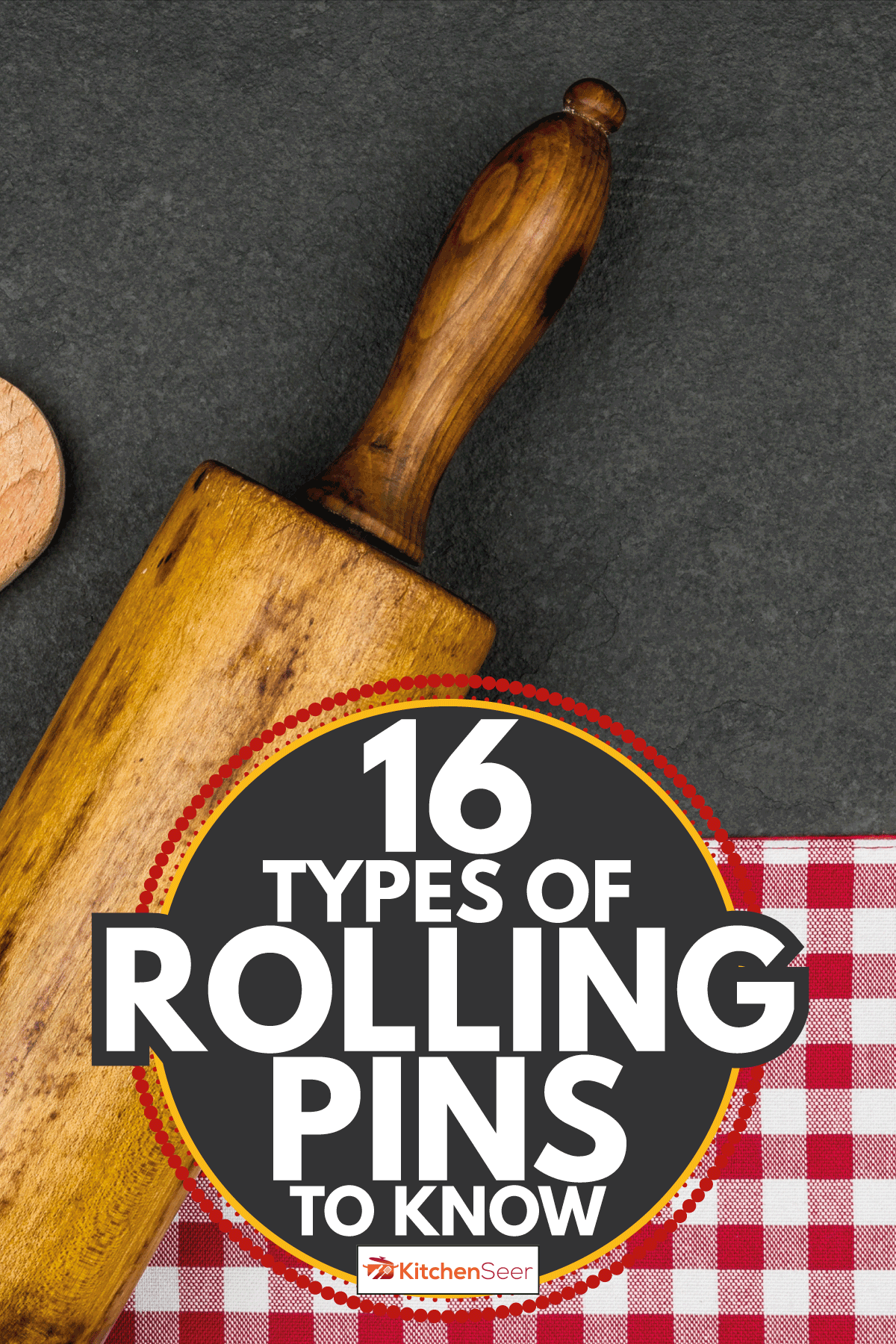
Shapes
1. French (Tapered) Rolling Pin
Many professional bakers consider the French style of rolling pins to be the best design. They report this design is perfect for dispersing pressure and weight evenly. It gives you a more sensory experience while rolling doughs, the pin becoming a natural extension of your hands.
Check out this French rolling pin on Amazon.
2. Traditional Rolling Pin
The traditional rolling pin is very common in the United States. It's a comfortable classic. It has handles that allow you to comfortably grip with your hands, leveraging your arms allowing you to push and pull the pin forward and back with ease.
You can find traditional styles with stationary handles or luxury models with internal ball bearings. Most bakers prefer non-stationary handles if they're using this type.
Check out this traditional rolling pin on Amazon.
3. Dowel (Straight) Rolling Pin
This is a very rudimentary, straightforward rolling pin. It is designed to be basically an even stick. They are very sturdy and like the French style, allow one of the least restrictive environments as far as being able to "feel" the dough through the pin.
Check out this dowel-style rolling pin on Amazon.
4. Lasercut/Textured Rolling Pin
A lasercut or textured rolling pin has a design cut on the surface to really add some flair to your dough. They work best with dough that does not tend to rise, rising doughs blurs the design and makes the texture or design hard to see or lost altogether. They can be a great addition when making shortbread or cracker dough during the holidays. You can create a nice decorative surface on the cookie. They're also commonly used in cake decorating when using fondant to create an embossed design.
Check out this lasercut rolling pin on Amazon.
5. Precision
These can be as large as 25" long and either have adjustable silicone rings or a built-in raised edge on the wooden versions, allowing for a recessed center. These are great if you're making batches of dough that need to be the same size because having the recessed center acts as a built-in spacer for the dough.
Check out this precision rolling pin on Amazon.
6. Multipurpose
These are your typical dowel-style or French pin design with an actual meat tenderizer built into one of the ends. They advertise being able to easily tenderize meat or crush ice and nuts with the tenderizing end.
Check out this multipurpose rolling pin on Amazon.
Materials
Rolling pins can be found in many, many different materials. Here we will talk a bit about popular materials used and what benefits they boast.
1. Wood
Wood is by far the most popular material used for rolling pins. They're a classic for a reason. They are easy to use and work well.
Check out this wooden rolling pin on Amazon.
2. Marble
Marble is another popular rolling pin material. The marble is a much smoother, less porous surface than the wooden pins, making it less likely that the dough will stick to the pin without the need for additional flour. The marble pins can also stay colder for a longer period of time helping to keep the dough cool. This is a benefit if working with chilled dough.
Check out this marble rolling pin on Amazon.
3. Silicone
These have only been around a few years and are quickly becoming a favorite. If you want a rolling pin that is truly nonstick, then silicone is probably your best bet. This material is extremely durable, virtually nothing sticks to it, and it can be cleaned in the dishwasher! This makes clean-up a breeze.
Check out this silicone rolling pin on Amazon.
4. Acrylic
These acrylic rolling pins are virtually nonstick and easy to clean. They are almost exclusively used by cake decorators for fondant shaping. You can also commonly find them in a textured or embossed variety as well.
Check out these acrylic rolling pins on Amazon.
5. Polyethylene
Polyethylene (also known as plastic) rolling pins are made for more delicate work such as sugar paste, marzipan, gum paste, and fondant. They are a great nonstick, easy-to-clean option for bakers. They're commonly used in bakeshops and bakeries.
Check out this polyethylene rolling pin on Amazon.
6. Glass
These aren't found all that often on the market and are considered rare, as they are usually antiques. There are some modern hand-blown glass rolling pins found on the market nowadays. The vintage ones were commonly made of milk glass and sometimes clear glass as well.
If you find yourself without a rolling pin in your kitchen, you can use a glass wine bottle as a rolling pin quite effectively. This video clip below demonstrates:
7. Granite
These stone rollers are visually appealing for many people. They are heavy but they provide a good weighted rolling pin, keep the dough cool, and boast nonstick properties. The one big downside to consider with granite pins are their cost and fragility. If you aren't prepared for the weight and it slips, there is a good chance it will break.
Check out this granite rolling pin on Amazon.
8. Aluminum
These are very easy to clean, lightweight, and can be chilled in either the refrigerator or freezer.
Check out this aluminum rolling pin on Amazon.
9. Stainless Steel
These are probably the second most popular rolling pins after wood. They are highly durable, nonporous, able to be chilled, clean easily, and are affordable.
Check out this stainless steel rolling pin on Amazon.
10. Copper
Copper pins are a showstopper in the kitchen. They report having great nonstick qualities and retain a cool temp as well. They also retain warmth when working with warmer doughs or candies.
Final Thoughts
You can find rolling pins in so many shapes, sizes, and materials. Your final decision will depend on what type of dough you intend to roll out most. Whatever you're looking for in a rolling pin, there is most definitely a product on the market to meet your specific needs!
If you've enjoyed this article, please consider the following:
Can You Knead Dough With A Rolling Pin?
Can You Put A Rolling Pin In The Dishwasher?
Kitchen Utensils: The Ultimate List [Do You Know All 56?]















